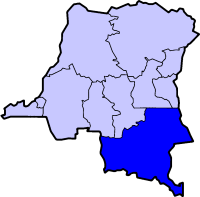Shaba
From Roach Busters

| |
| Provincial flag of Shaba | |

| |
|---|---|
| Country | Zaire |
| Capital | Lubumbashi |
| Largest city | Lubumbashi |
| Languages | Swahili, Tshiluba |
| Area | 496,871 km² |
| Governor | Nathan Nguz |
| Population | 4,125,000 |
| Density | 8.30/km² |
| Districts | 5 |
| Cities | 3 |
Shaba (formerly called Katanga) is the southeastern province of Zaire. Due to its vast geological wealth, the strategic value of this province is inestimable. The bulk of the nation's copper reserves, as well as significant reserves of cobalt, tin, radium, uranium, and diamonds. These minerals have been a curse and a blessing for Shaba and her people over the years, as their immense value has the potential to make it a prosperous, thriving region, yet also an alluring prize that has attracted the attention of many plunderers and would-be plunderers over the years.
The province came under Belgian control in the late 19th century, or more specifically, under the control of Union Minière du Haut Katanga (known today as Gécamines). While the Belgians were heavy-handed and exploitive in subduing the population, they did develop and modernize the province to a much greater extent than the rest of the Belgian Congo (as Zaïre was then known), making it a relatively prosperous region.
After the Belgian Congo became indepdent in 1960 and shortly afterwards disintegrated into civil war, the Christian, pro-Western, anticommunist president of Katanga, Moise Tshombe, declared Katanga's secession from the Congo and announced that it was now an independent state. While the rest of the Congo was devastated by plunder, rape, murder, and all-out war, Katanga thrived as a peaceful, prosperous bastion of liberty and anticommunism. Unfortunately, Patrice Lumumba, the firebrand prime minister of the Congo, called in United Nations "peacekeepers" to forcibly re-integrate Katanga with the Congo, literally at gun-point. Resorting to brutal terrorist tactics such as rape, bombing hospitals, gunning down ambulances, and bayoneting children, the U.N. soldiers savagely terrorized the people into submission, finally forcing Tshombe to surrender. Katanga's war of freedom thus over, it was re-united with the Congo.
In 1965, Joseph-Désiré Mobutu (later Mobutu Sese Seko) came to power in the Congo via a coup d'etat, and in 1971 changed the name of Katanga to Shaba and the name of the country to Zaire. Shaba remained relatively peaceful, except for 1977 and 1978, when rebels invaded via Angola and Zambia, respectively. In both cases, Mobutu called on his foreign friends to help, and they routed the rebels.
